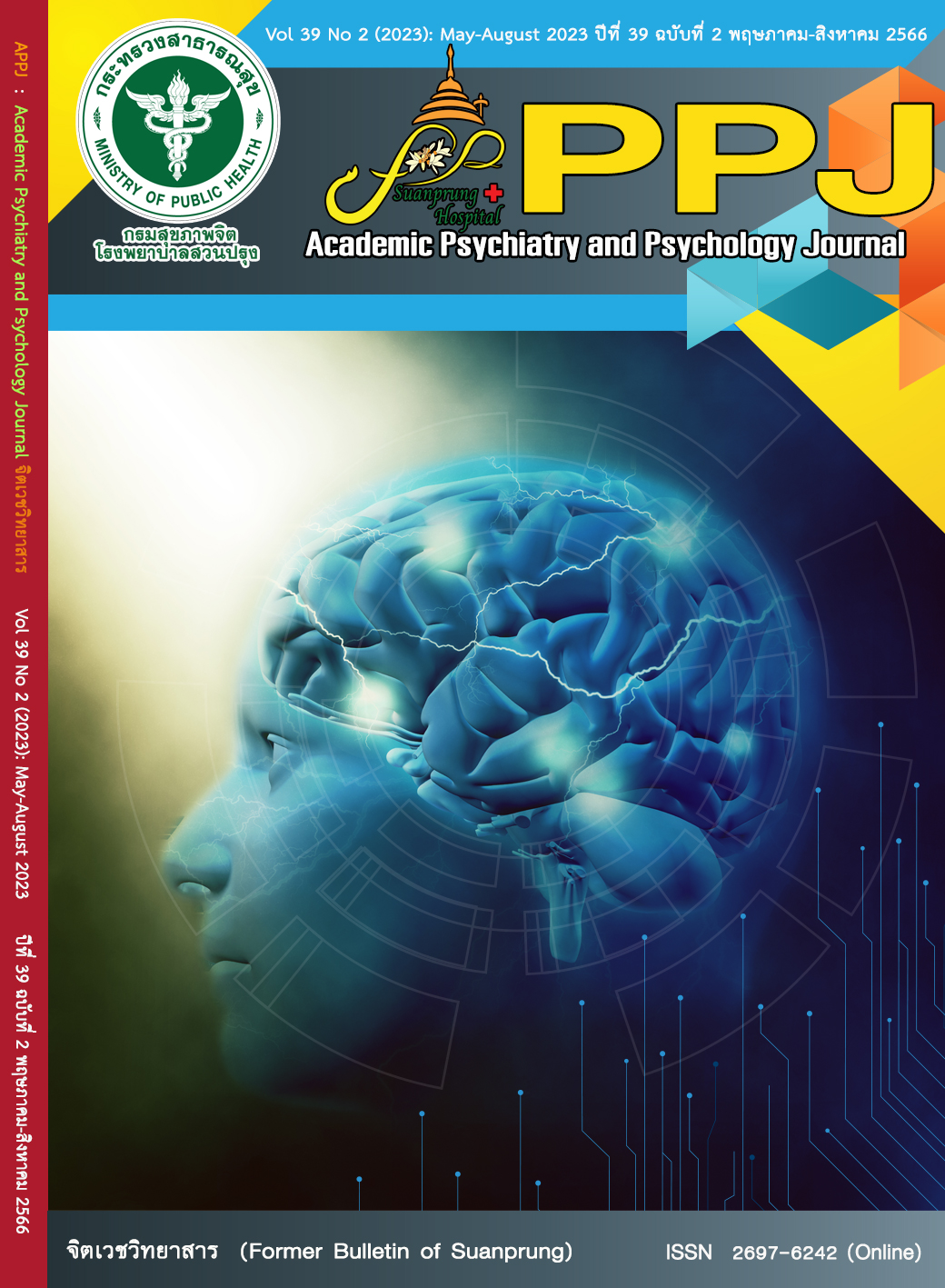The mental health of university students during and after the emergency announcement of Chiang Mai University amid the COVID-19 pandemic
Main Article Content
Abstract
Objective: The study aimed to assess the prevalence of mental health adverse outcomes including stress, depression, and suicide of Chiang Mai University (CMU) students during and after the emergency announcement amid the COVID-19 pandemic.
Materials and methods: A cross-sectional analytical study was conducted to collect two periods which were during (March 26th to August 2020) and after (November 2020 to January 2021) the emergency announcement of CMU amid the COVID-19 epidemic. Online questionnaires including the Perceived Stress Scale (PSS), the Patient Health Questionnaire-9 (PHQ-9), and the eight-question (8Q) assessment were used via the Survey Monkey™ Program. Data were analyzed using descriptive statistics, Paired t-test, or Wilcoxon's signed rank test.
Results: The mental health scores of all 276 students, which compared ‘during’ and ‘after’ the emergency announcement, revealed that the mean PSS scores were 19.30±6.28 vs. 16.06±5.79 (p<0.001), median (IQR, min-max) scores of the PHQ-9, and 8Q scores were 8(7.5, 0-24) vs. 8(8, 0-24) (p=0.047), 0(0,0-33) vs. 0(0, 0-33) (p=0.109), respectively.
Conclusion: The stress and depression scores during the university emergency announcement for the COVID-19 epidemic were statistically significantly higher than the period after the announcement. Systematically assessing the students’ mental health is needed during emergency announcement circumstances such as the COVID-19 epidemic, and appropriate measures should be taken in a timely manner.
Article Details

This work is licensed under a Creative Commons Attribution-NonCommercial-NoDerivatives 4.0 International License.
บทความหลังผ่านการปรับแก้จากกองบรรณาธิการแล้ว เป็นลิขสิทธ์ของวารสารจิตเวชวิทยาสาร โรงพยาบาลสวนปรุง กรมสุขภาพจิต กระทรวงสาธารณสุข ห้ามเผยแพร่เพื่อประโยชน์ทางการค้าโดยไม่ได้รับอนุญาต แต่อนุญาตให้เผยแพร่บทความดังกล่าวเพื่อประโยชน์ทางการศึกษาแก่ประชาชนทั่วไป ทั้งนี้กองบรรณาธิการไม่จำเป็นต้องเห็นด้วยกับบทความหรือข้อคิดเห็นใดๆ ที่ปรากฏในวารสารสวนปรุง
References
World Health Organization. WHO Coronavirus (COVID-19) Dashboard [Internet]. 2023 [cited 2023 Jan 29]. Available from: https://covid19.who.int/.
Department of Disease Control. Coronavirus infections, The situation in Thailand. [Internet]. 2023 [cited 2023 Jan 29]. Available from: https://ddc.moph.go.th/covid19-dashboard/?dashboard=main.
Chappell Bill. WHO Sets 6 Conditions for Ending A Coronavirus Lockdown. [Internet]. 2020 [cited 2020 Aug 16]. Available from: https://www.npr.org/sections/goatsandsoda/2020/04/15 /834021103/who-sets-6-conditions-for-ending-a-coronavirus-lockdown.
Social Distancing: Keep a Safe Distance to Slow the Spread. Centers for Disease Control and Prevention. [Internet]. 2020 [cited 2020 Aug 16]. Available from: https://www.cdc.gov /coronavirus/2019-ncov/prevent-getting-sick/social-distancing.html.
Al-Jabird A, Alsafib Z, Iosifidisc C, Kerwand A, Nicolaa M, Sohrabic C, et al. The socio-economic implications of the coronavirus pandemic (COVID-19): A review. Int Jour Surg 2020;78:185-193.
Bu F, Steptoe A, Fancourt D. Loneliness during lockdown: trajectories and predictors during the COVID-19 pandemic in 38,217 United Kingdom adults. Soc Sci Med. 2020; 265:113521.
Rauschenberg C, Schick A, Goetzl C, Roehr S., Riedel-Heller SG., Koppe G, et al. Social isolation, mental health and use of digital interventions in youth during the COVID-19 pandemic: a nationally representative survey. Pyrexia. 2020:1-28.
Hawkley LC, Cacioppo JT. Loneliness matters: a theoretical and empirical review of consequences and mechanisms. Ann Behav Med. 2010; 40:218- 227.
Holmes EA, O'Connor RC, Perry VH, Tracey I, Wessely S, Arseneault L, et al. Multidisciplinary research priorities for the COVID-19 pandemic: a call for action for mental health science. Lancet Psychiatry. 2020; 7(6): 547-560.
Lim MH, Holt-Lunstad J, Badcock JC. Loneliness: contemporary insights into causes, correlates, and consequences. Soc Psychiatry Psychiatr Epidemiol. 2020; 55: 789- 791.
Ford T, Hatch S, Hope H, Hotopf M, John A, Pierce M, et al. Mental health before and during the COVID-19 pandemic: a longitudinal probability sample survey of the UK population. Lancet Psychiatry 2020;7:883-892.
AlAteeq D, AlEesa D, Aljhani S. Perceived stress among students in virtual classrooms during the COVID-19 outbreak in KSA. J Taibah Univ Medical Sci 2020;15:398-403.
Hegde S, Keller K, Smith A, Son C, Sasangohar F, Wang X. Investigating Mental Health of US College Students During the COVID-19 Pandemic: Cross-Sectional Survey Study. J Med Int Res 2020;22.
Diakogiannis I, Fountoulakisc KN, Kaparounaki CK, Mousa DV, Papadopoulou E.VK, Papadopoulou K.KK, et.al. University students’ changes in mental health status and determinants of behavior during the COVID-19 lockdown in Greece. Psych Res 2020;292.
Kerdcharoen, N., Kolkijkovin, V., & Thaworn, J. (2021). Resilience, Mental Health Impact and COVID-19 Related Mental Health Determinants among Medical Students during COVID-19 Epidemic. Vajira Medical Journal: J Urban Med, 65(Supplement November), S101–116.
Requirement Issued under Section 9 of the Royal Decree. Public Administration in Emergency Situations 2005. (2020, 12 June). Royal Gazette. Volume 137, Issue 10.
Chiang Mai University. (2020, August 13). Announcement of Chiang Mai University on masures to relax the surveillance of the outbreak of the Coronavirus Disease 2019 (COVID-19) among staff and students of Chiang Mai Unviersity.
Statistics report on the number of Chiang Mai University students. Chiang Mai University. [Internet]. [cited Sept. 18,2020]. Available from: https://www3.reg.cmu.ac.th/mis-reg/misreport-new/student_9.php.
Wongpakaran N, Wongpakaran T. The Thai version of the PSS-10: an investigation of its psychometric properties. Biopsychosoc Med 2010;4:6.
Lotrakul M, Sumrithe S, Saipanish R. Reliability and validity of the Thai version of the PHQ-9. BMC Psychiatry 2008;8:46.
Department of Mental Health, Ministry of Public Health. Guidelines for the use of mental health tools for health personnel in community hospitals (Chronic Disease Clinic) Revised Edition. Nonthaburi: Agricultural Cooperative Assembly of Thailand Limited; 2015.
Lee, J., Solomon, M., Stead, T. et al. Impact of COVID-19 on the mental health of US college students. BMC Psychol 2021;9,95.
Son C, Hegde S, Smith A, Wang X, Sasangohar F. Effects of COVID-19 on College Students’ Mental Health in the United States: Interview Survey Study J Med Internet Res 2020;22:e21279.
Shuang-Jiang Zhou, Li-Gang Zhang, Lei-Lei Wang, Zhao-Chang Guo, Jing-Qi Wang, et al. Prevalence and socio-demographic correlates of psychological health problems in Chinese adolescents during the outbreak of COVID-19. Eur Child Adolesc Psychiatry. 2020: 1–10.
Meda N, Pardini S, Slongo I, Bodini L, Zordan MA, Rigobello P, Visioli F, Novara C. Students' mental health problems before, during, and after COVID-19 lockdown in Italy. J Psychiatr Res. 2021;134:69-77.

